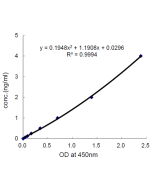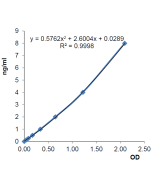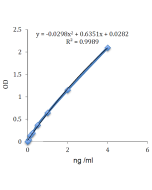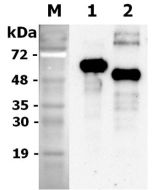Cookie Policy: This site uses cookies to improve your experience. You can find out more about our use of cookies in our Privacy Policy. By continuing to browse this site you agree to our use of cookies.
AdipoGen Life Sciences
Progranulin (human) (rec.) (untagged)

Method: Sortilin (human) (rec.) (His) (Prod. No. AG-40B-0229) is coated on an ELISA plate at 1 μg/ml overnight at 4°C. Progranulin (human) (rec.) (untagged) (Prod. No. AG-40A-0188Y) or the Flag-tagged version of Progranulin (Prod. No. AG-40A-0068Y) is added (starting at a concentration of 100nM with a twofold serial dilution) during one hour at RT and the interaction is then detected using a biotinylated anti-human Progranulin.
| Product Details | |
|---|---|
| Synonyms | Proepithelin; PEPI; PC Cell-derived Growth Factor |
| Product Type | Protein |
| Properties | |
| Source/Host | HEK 293 cells |
| Sequence |
Signal peptide and human progranulin (aa 1-593) is untagged. Reflects the native sequence with no additional aa. |
| Crossreactivity | Human |
| Biological Activity |
Binds to human sortilin. Activates phospho-ERK1/2 in neuronal mouse P19 cells. Regulates food intake and body weight (see reference 1). |
| MW | ~90kDa (glycosylated protein by SDS-PAGE) |
| Purity | ≥98% (SDS-PAGE) |
| Endotoxin Content | <0.01EU/μg purified protein (LAL test; Lonza). |
| Concentration |
After reconstitution: for 10µg size: 0.1mg/ml for 50µg size: 1 mg/ml |
| Reconstitution |
10µg size: Reconstitute with 100µl sterile water. 50µg size: Reconstitute with 50µl sterile water. |
| Formulation | Lyophilized. Contains PBS. |
| Other Product Data |
Uniprot link P28799: Granulins (human) [Precursor] |
| Shipping and Handling | |
| Shipping | BLUE ICE |
| Short Term Storage | +4°C |
| Long Term Storage | -20°C |
| Handling Advice |
After reconstitution, prepare aliquots and store at -20°C. Avoid freeze/thaw cycles. Centrifuge lyophilized vial before opening and reconstitution. PBS containing at least 0.1% BSA should be used for further dilutions. |
| Use/Stability |
Stable for at least 6 months after receipt when stored at -20°C. Working aliquots are stable for up to 3 months when stored at -20°C. |
| Documents | |
| MSDS |
 Download PDF Download PDF |
| Product Specification Sheet | |
| Datasheet |
 Download PDF Download PDF |
Progranulin (PGRN) is a widely expressed pluripotent growth factor which plays a role in processes such as development, wound repair and inflammation by activating signaling cascades that control cell cycle progression and cell motility. Its function in the central nervous system is of interest, as mutations in the PGRN gene were found in cases of frontotemporal degeneration (FTLD). In addition, PGRN has also been linked to tumorigenesis. Progranulin is a biomarker for FTLD, other types of Alzheimer‘s Disease (AD) and potentially for MCI (Mild Cognitive Impairment). Additionally, PGRN is described as a new ligand of TNF receptors and a potential therapeutic against inflammatory disease like arthritis. EphA2, a member of the large family of Ephrin receptor tyrosine kinases, is also a functional signaling receptor for progranulin as reported recently.
- Involvement of Progranulin in Hypothalamic Glucose Sensing and Feeding Regulation: H.K. Kim, et al.; Endocrinology 152, 4672 (2011)
- Progranulin directly binds to the CRD2 and CRD3 of TNFR extracellular domains: J. Jian, et al.; FEBS Lett. 587, 3428 (2013)
- Progranulin and a five transmembrane domain-containing receptor-like gene are the key components in receptor activator of nuclear factor B (RANK)-dependent formation of multinucleated osteoclasts: J. Oh, et al.; J. Biol. Chem. 290, 2042 (2015)
- New discovery rarely runs smooth: an update on progranulin/TNFR interactions: B.C. Wang, et al.; Protein Cell 6, 792 (2015)
- Progranulin regulates lysosomal function and biogenesis through acidification of lysosomes: Y. Tanaka, et al.; Hum. Mol. Genet. 26, 969 (2017)
- SorCS2 binds progranulin and regulates motor axon outgrowth: PB. Thomasen, et al.; Cell Rep. 42, 113333 (2023)











